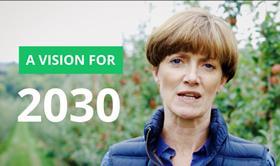
Amid a persistently downbeat national news cycle, the happy news that Britain can look forward to the “best-tasting apples this century” has made for a welcome reprieve. A cold winter followed by plentiful sun and beneficial temperatures has boosted the sweetness and colour of British and European topfruit this season.
And there’s more reason for cheer, with English Apples & Pears (EAP) launching an ambitious plan to boost the market share of UK-grown apples from 42 to 60 per cent by 2030. The strategy was unveiled with a promotional film at the Great British Apples season launch at the Electric Cinema in London on October 4.
Speaking in the film, EAP executive chair Ali Capper told viewers: “In our opinion there’s a massive opportunity for growth. With the right support from both government and retail there’s an opportunity to grow market share to 60 per cent by 2030. Everyone at English Apples & Pears is up for the challenge.”
EAP’s strategy will target four areas: immigration policy, modern farming technology, investment in what consumers want, and telling their story. “Our first priority is to work with the government to secure the immigration policies that our sector needs,” Capper said.
Boxford Farms grower Robert Rendall said: “We know that people want red juicy crunchy and sweet apples, so growers are investing in new orchards and varieties to deliver that great British apple. We need government to deliver bespoke R&D funding to speed up that investment.”
A high-quality crop this autumn is exactly the kick-start the Great British Apples campaign needs. Steve Maxwell, CEO of Worldwide Fruit, said: “It’s been a decent summer and the warm temperatures should lead to great-tasting fruit. I also expect there will be great colour too. I think there’s a positive outlook.”
The general consensus is of a slightly lower crop this year, but not enough to cause a stir.AC Goatham’s commercial director Carol Ford said: “We are currently just over halfway through harvest, so we are still evaluating numbers. This season’s crop has been a ‘showy’ crop, and not just in the UK, but in Europe.The crop quality is excellent for British production and the fruit is eating very well.”
This year’s extreme weather, with a very cold winter and scorching summer, is the natural culprit for the lower forecast. James Simpson, managing director for Adrian Scripps, said he experienced one of the hardest June drops in recent years, resulting in a difficult growing season.
“The issues came shortly after flowering and at early fruitlet stages. What appeared to be a good fruit set soon turned into one of the hardest and longest fruit run-offs for some years. In late May and through most of June some varieties and orchards suffered significant loss of fruitlets; it is unclear if this was related to the light frost in May or the severe weather in the winter.”
One of EAP’s hardest tasks will be to turn around declining sales volumes – down five per cent in the past three years – in part due to retailers switching from larger volume packs to six-packs, according to Ford. She suggested the decline has also been down to a quality gap between British crops and their distant rivals.
“If figures now show it is falling, then this is due to poorer quality supplies from southern hemisphere growers during the summer months here in the UK,” said Ford. “There is now a significantly marked difference in the quality between the superb UK fruit and the poorer imports, meaning any decline is seen during the summer months. Clearly where we are looking to extend the British season will hopefully stop this decline and turn it around.”



